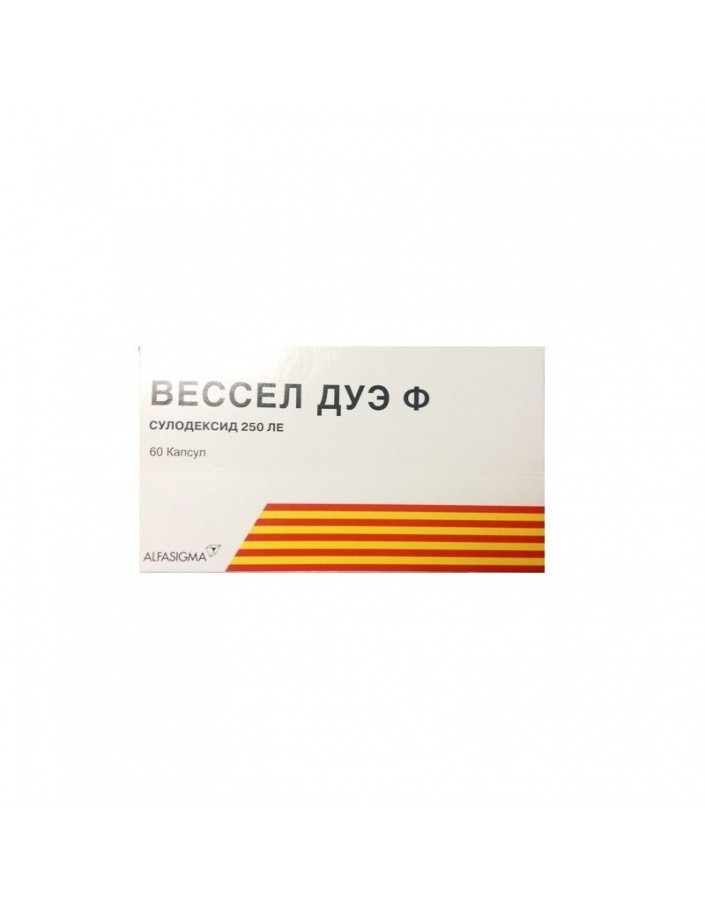




Security policy (edit with Customer reassurance module)

Delivery policy (edit with Customer reassurance module)

Return policy (edit with Customer reassurance module)
Capsules: 1 capsule Wessel duo contains sulodexide 250 lipasemic units (LU);
Excipients: sodium lauryl sulfate, 3.3 mg, colloid, silica, 3.0 mg, triglycerides, 86.1 mg;
capsule composition: gelatin - 55.0 mg; glycerin - 21.0 mg; sodium ethyl p-hydroxybenzoate - 0.24 mg; sodium propyl-p-hydroxybenzoate - 0.12 mg; titanium dioxide (E171) - 0.30 mg; red iron oxide - 0.90 mg
1 ampoule Wessel duo (2 ml) contains sulodexide 600 lipasemic units (LU);
Excipients: sodium chloride - 18 mg; injection water - q.s. up to 2 ml
WESSEL DUE F (sulodexide) is a natural mixture of glycosaminoglycans (GAG): a rapidly moving heparin-like fraction (80%) and dermatan sulfate (20%).
Sulodexide is a natural product, extracted and isolated from the mucous membrane of the small intestine of animals.
The drug Vessel Due is not a simple sum of its components, therefore the mechanism of sulodexide action is determined by the interaction of both fractions.
The drug Vessel Due does have a strong antithrombotic effect, which is realized
through:
1) suppression of activated factor X;
2) enhancement of the synthesis and secretion of prostacyclin (prostagladin l2);
3) decrease in the level of fibrinogen in the blood.
The fibrinolytic action of the Vessel DUE F is realized through:
1) an increase in the level of tissue plasminogen activator (TAL) in the blood;
2) a decrease in the blood content of a tissue plasminogen activator inhibitor (ITAP).
Thus, it is necessary to emphasize that sulodexide is effective both for the prevention of thrombus formation in arteries and veins, and in relation to the lysis of an already formed thrombus.
WESSEL DUE F has an angioprotective effect, which is realized through:
1) restoration of the structural and functional integrity of the vascular endothelium cells;
2) restoration of the normal density of the negative electric charge of the pores of the basement membrane of the vessels.
In addition, the preparation WESSEL DUE F has a positive effect on the rheological properties of blood due to:
1) reduction of blood triglycerides (through the mechanism of activation of lipoprotein lipase);
2) reduce blood viscosity.
Vessel DUE F is highly effective in diabetic nephropathy. The mechanism of action of the drug Vessel Due, in addition to the above, is determined by:
1) a decrease in the thickness of the basement membrane up to normal;
2) a decrease in the production of the matrix by reducing the proliferation of mesangium cells.
Sulodexide exhibits a weak anticoagulant effect due to inhibition of Heparin cofactor II, which is manifested when intravenous administration of large doses of the drug and is reduced to the minimum with intramuscular and oral administration.
Vascular pathology with an increased risk of blood clots.
Vascular complications of diabetes mellitus (nephropathy, diabetic foot, retinopathy)
Individual hypersensitivity to the drug Vessel Due; hemorrhagic diathesis and diseases associated with an increased risk of bleeding; pregnancy (I term).
In the absence of other prescriptions from the attending physician.
Capsules: 1 capsule Wessel duo twice a day between meals.
Ampoules: 1 ampoule per day intramuscularly.
The course of treatment should begin with the daily use of 1 ampoule for 15-20 days. Then, for 30-40 days, therapy should be continued with the drug in the form of capsules.
The full course of treatment should be repeated at least twice a year.
By decision of the attending physician, the dosage of the drug Vessel Due can vary in quantity and frequency.
On the part of the digestive tract: nausea, vomiting, epigastric pain.
Allergic reactions: rash.
Other: pain, burning, hematoma at the injection site.
Symptoms: bleeding or bleeding.
Treatment: drug withdrawal, symptomatic therapy.
In pregnancy, Wessel Due is prescribed under the strict supervision of a physician. There is a positive experience of use for the treatment and prevention of vascular complications in patients with type 1 diabetes in the II and III trimesters of pregnancy,with the development of late toxicosis of pregnant women - gestosis.
Given the weak anticoagulant effect, it is recommended to periodically monitor the parameters of the coagulogram. At the beginning and end of treatment, it is advisable to determine the following indicators: APTT (normally - 30-40 s, depending on the type and concentration of the activator used can be 25-30 or 35-50 s), antithrombin III (normally - 210-300 mg / l), bleeding time (normally according to Duque - 2-4 min), clotting time of unstabilized blood (normally according to the Milian method in the Moravits modification - 6-8 min). Wessel Due F increases normal performance by approximately one and a half times.
The simultaneous use of the Wessel duo with drugs that affect the hemostatic system (direct and indirect anticoagulants, antiplatelet agents) is not recommended.
List B. At a temperature not higher than 30 ° C
5 years.